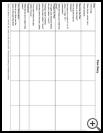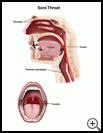
Sore Throat (Pharyngitis): Teen Version
What is a sore throat?
When your throat hurts it is often a symptom of an illness, such as a cold. When someone looks at the throat with a light, it will be bright red.
What is the cause?
Most sore throats are caused by viruses and are part of a cold. About 10% of sore throats are caused by strep bacteria.
Tonsillitis (temporary swelling and redness of the tonsils) is usually present with any throat infection, viral or bacterial. The presence of tonsillitis does not have any special meaning.
Teens who sleep with their mouths open often wake in the morning with a dry mouth and sore throat. It feels better within an hour of having something to drink. Use a humidifier to help prevent this problem.
Teens with a postnasal drip from draining sinuses often have a sore throat from the secretions or from frequent throat clearing. Talk to your healthcare provider about treatment for sinus infections.
How long does it last?
Sore throats caused by viral illnesses usually last 4 or 5 days.
Strep throat responds well to antibiotics. After you have been taking medicine for strep for 24 hours, strep is no longer contagious. You can then return to school if your fever is gone and you feel better. Take all of the antibiotic even if you are feeling better. If you don't take all of it, the infection could come back.
Why do a rapid Strep test or throat culture?
A throat culture or rapid strep test is the only way to know whether a sore throat is caused by strep bacteria or a virus. Without treatment, a strep throat has a small risk for acute rheumatic fever. Rheumatic fever is a complication of strep infections that can lead to permanent damage to the valves of the heart. The Strep test is not urgent, however, since treating a strep infection within 7 days of when it begins can prevent rheumatic fever.
A Strep test is not necessary if your sore throat is part of a cold AND the main symptom is croup, hoarseness, or a cough, unless the sore throat lasts more than 5 days.
Rapid strep tests are helpful only when their results are positive. If they are negative, a routine throat culture is usually done to pick up the 10% of strep infections that the rapid tests miss. Avoid rapid strep tests done in shopping malls or at home because they tend to be inaccurate.
How do I take care of myself?
- Throat pain relief
Gargle with warm saltwater (1/4 teaspoon of salt per glass) or an antacid solution. Suck on hard candy (butterscotch seems to be a soothing flavor).
- Diet
A sore throat can make some foods hard to swallow. Eat a diet of soft foods for a few days. Cold drinks and milkshakes are especially good. Avoid salty or spicy foods or citrus fruits.
- Fever and pain relief
Take acetaminophen (Tylenol) or ibuprofen (Advil) for the sore throat or for fever over 102°F (39°C).
- Common mistakes in treating sore throat
- Avoid expensive throat sprays or throat lozenges. Not only are they no more effective than hard candy, but many also contain an ingredient (benzocaine) that may cause an allergic reaction.
- Do not use leftover antibiotics from siblings or friends. Antibiotics help only strep throats. They have no effect on viruses, and they can cause harm. They also make it difficult to find out what is wrong if you become sicker.
- Don't smoke.
When should I call my healthcare provider?
Call IMMEDIATELY if:
- You are having great trouble swallowing (for example, you can't swallow your saliva).
- You are having trouble breathing.
- You are feeling very sick.
Call during office hours if:
- To make an appointment for a Strep test.
Last modified: 2009-08-13
Last reviewed: 2017-06-05


